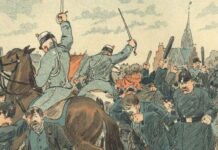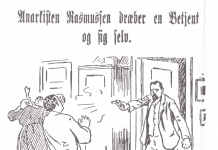
Socialistisk Biblioteks Tidslinje med links til begivenheder og personer i 1971.
Se også Index over personer, organisationer/partier og værker (som bøger, malerier, mm.), steder, begivenheder, mv., der er omtalt på hele Tidslinjen, titler og indhold på emnelisterne osv.
24. januar 1971
Første økonomiske topmøde i Davos, Schweiz (24. januar – 7. februar), da World Economic Forum’s første møde blev arrangeret af Europa Kommission sammen med europæiske industriledere. Møderne til op til en uges sammenkomst for verdens økonomiske og politiske ledere.
Se:
- World Economic Forum (Denstoredanske.dk)
- World Economic Forum (Wikipedia.org)
- Social and political crisis hangs over World Economic Forum in Davos. By Nick Beams (World Socialist Web Site, 26 January 2012)
- Davos dilemma (Michael Roberts Blog, January 26, 2012)
30. januar 1971
Skatteadvokat Mogens Glistrups berygtede tv-fremtræden, hvor han sammenligner skattesnydere med besættelsestidens sabotører og praler af sin 0-trækprocent. Stifter herefter Fremskridtspartiet 22. august 1972.
Se:
- Tidslinjen 22. august 1972 om Fremskridtpartiet.
- Tidslinjen 6. oktober 1995 om Dansk Folkeparti.
6. marts 1971
Lægen Georg Moltved dør. (Født 23. april 1881).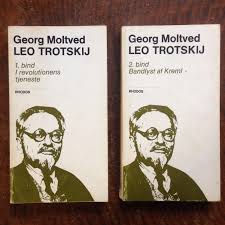
Lejrchef for flygtningelejren Blaavandslejren (1945).
Medlem af DKP efter krigen, ekskluderet 1950 for titoisme.
I 1955 blev Georg Moltved rekrutteret til Fjerde Internationale (Forenede Sekretariat) af Ernest Mandel. Moltved var sammen med en mindre gruppe blevet ekskluderet fra DKP i 1950 på grund af sin kritik fra venstre. Han indgik siden mere eller mindre formaliseret i den danske Fjerde Internationale-sektions arbejde. Han oversatte Trotskijs værk Revolutionen forrådt (Borgen, 1960) og skrev biografier om Trotskij (1971) og om Lenin (1966).
Se:
Georg Moltved (Lubitz’ TrotskyanaNet; Bio-bibliographical sketch, 3 sider). Corrections by Bertel Nygaard + Selective bibliography & notes on archive.
Litteratur:
Kulturkamp i Danmark. Af Georg Moltved (Kronik i Information, 1. oktober 1953). Online som indskannet text på Socbib.dk. Appendiks på linkboxen Kulturradikalismen.
Kulturkampen. 3. Aargang, nr. 2, April 1937. Af Georg Moltved (Temanummer om Den spanske Borgerkrig). 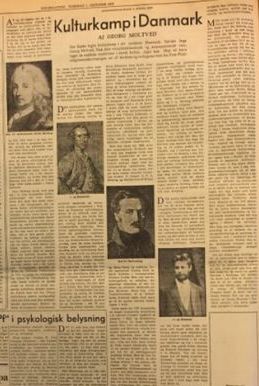
Leo Trotskij. Af Georg Moltved (Rhodos, 1971, 471 sider). Bind 1: I revolutionens tjeneste + bind 2: Bandlyst af Kreml.
Lenin: en biografi. Af Georg Moltved (Borgen, 1966, 335 sider)
Kommunisme i Danmark: en marxistisk-politisk analyse af Danmarks kommunistiske Parti siden besættelsen. Af Georg Moltved (1953, 48 sider)
4. juni 1971
Den ungarske marxistiske filosof og litteraturkritiker (Georg) György (Szegedi) Lukács, dør i Budapest (født 13. april 1885 samme sted).
Kulturminister under den ungarske revolution i 1956** og 37 år tidligere undervisningsminister i den ungarske sovjetregering marts-september 1919.
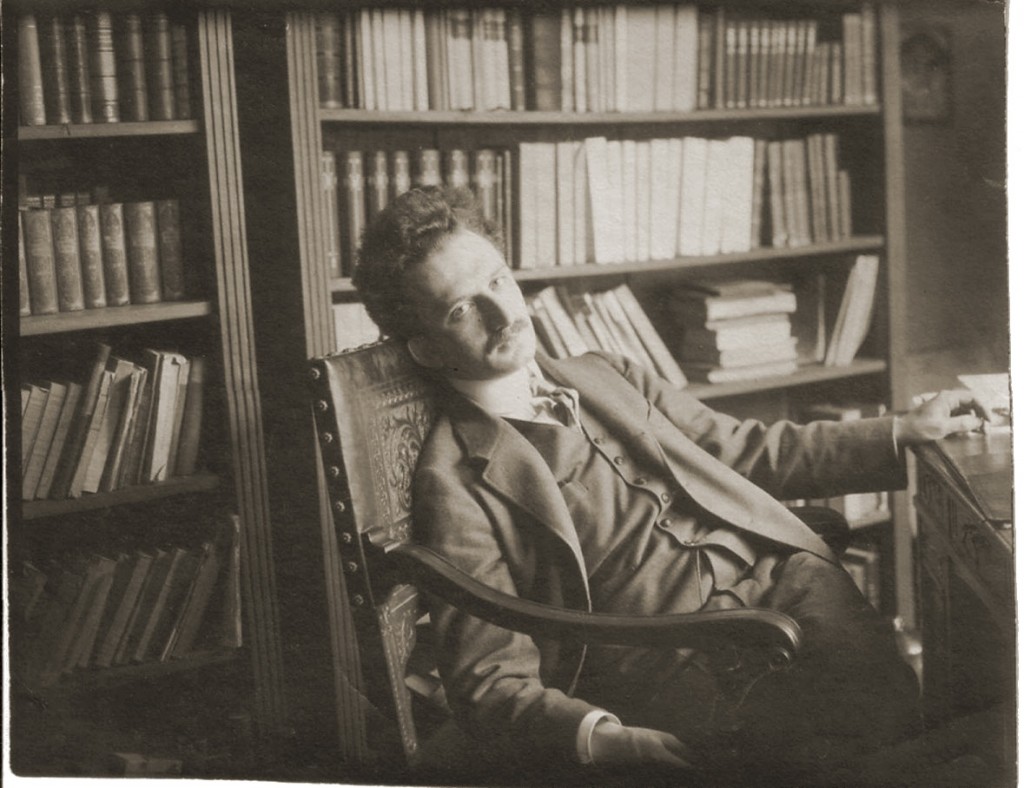
** Se også på Socialistisk Bibliotek:
- Linksamlingen Ungarn / Hungary 1956
- Tidslinjen 21. marts 1919 om ungarske rådsrepublik 1919
Leksikale/Sites mv.:
- Lukács, György (Leksikon.org)
- Georg Lukács (Denstoredanske.dk)
- George Lukacs (Spartacus Educational)
- György Lukács (Wikipedia.org)
- Glossary of people: Lukács, Georg (Marxists Internet Archive)
Georg Lukacs Archive (Marxists Internet Archive). Biography – Early Works – from History & Class Consciousness to later Literary Criticism – from The Young Hegel (1938) – post 1945-works.
Lucacs online på skandinaviske sprog:
Georg Lucács 1885-1971 (Marxists Internet Archive; norsk afdeling).Tekster på Norsk bokmål, bl.a. Bolsjevismen som moralsk problem (1918); Kritiske kommentarer til Rosa Luxemburg: Den russiske revolusjon (1923); Bukharins historiske materialisme (1925) Innledning til Lenin – handlingens teoretiker (1967)(skrevet 1924).
Texter av och om Georg Lucacs (Marxistarkiv.se). Svensksprogede artikler, bl.a om Rosa Luxemburg, og online bøger, bl.a klassikerne Historia och klassmedvetande (1923) og Lenins tankevärld (1924).
Förnuftets banemän: från Nietzsche till Hitler (pdf). Av Georg Lukács (Arkiv, 1985, 205 s.; online på Marxistarkiv.se)
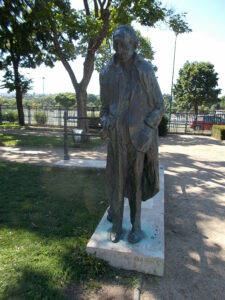
Articles:
Solzhenitsyn and the new realism. By George Lukacs (Socialist Register, 1965, p.197-215)
A hundred years of muddle (Weekly Worker, Issue 1443, 18 May 2023). “Marking the centenary of György Lukács’s hugely influential History and class consciousness, Mike Macnair spoke to an Online Communist Forum on May 14 about the book, the man and the politics.”
Scenes from history (Weekly Worker, Issue 1440, 27 April 2023). “First published a hundred year ago, History and class-consciousness has exerted considerable influence on left sects since the 1960s. Lawrence Parker investigates the philosophy and politics of György Lukács.”
Lukács and the tragedy of Revolution: Reflections on ‘Tactics and Ethics’. By John Bellamy Foster (Monthly Review, Vol.73, No.9, February 2022). “For Georg Lukács, revolution represented the realm of the objectively possible. He saw the tragedy of action as a necessary element in a movement toward greater human freedom synonymous with historical necessity.”
The life and work of Georg Lukács (Solidarity & Workers’ Liberty, Issue 511, 20 June 2019). “John Cunningham talked with Martin Thomas from Solidarity to preview the session on Lukács at Ideas for Freedom, 20-23 June.”
See also Martin Thomas: Lukács: another view (ibid., Issue 518, 25 September 2019) + John Cunningham: More comments on Lukács (ibid., Issue 519, 2 October 2019) + Martin Thomas: Lukács and “tailism” (ibid., Issue 520, 9 October 2019).
The conversion of Georg Lukács. By Daniel Lopez (Jacobin, 19 January 2019). “Born-again communist, Hungarian revolutionary, Marxist heretic — Georg Lukács was condemned from all sides during his time. Perhaps that’s why he’s perfect for ours.”
The destruction of history. By Róbert Nárai (Jacobin, 18 February 2018). “Hungary’s right-wing government is attempting to destroy the Georg Lukács’s archive — and his legacy.”
Realism, Modernism, and the spectre of Trotsky, Part 1: Lukács. By Neil Davidson (Red Wedge, December 11, 2017). “I want to approach the issue by way of a critique of the greatest twentieth–century defenders of realism and modernism; the Hungarian literary critic, Georg Lukács …”
Georg Lukacs: Lessons for struggle today. By Doug Enaa Greene (Links: International Journal of Socialist Renewal, July 1, 2015). “Far from being passe, Marxist and Leninist theory and practice remain strikingly relevant.”
Georg Lukács’s theory of revolution. By Daniel Lopez (Marxist Left Review, No.8, Winter 2014). “This article is intended to be a philosophical outline of a Lukácsian theory of politics and of the process of working class praxis.”
Lukacs and the pretenders. By Dave Renton (Lives; Running, 23/04/2013). “If there is any writer who sums up in one life all the contradictions of twentieth century Europe it is Georg Lukács.”
Supplement: The antinomies of Georg Lukács (Weekly Worker, Issue 946, January 24, 2013). “James Turley argues that his work constitutes an obstacle to revolutionary politics.” See also Debate: Lukács reloaded. By Lawrence Parker (Issue 952, March 7, 2013)
Capitalism and class consciousness: the ideas of Georg Lukács. By Chris Nineham (Counterfire, August 2010, 64 p.). “Free to read or download online, Chris Nineham’s short book looks at the ideas of Georg Lukács, the Hungarian revolutionary whose work explored the hold of capitalist ideas on workers’ consciousness and how it could be broken.”
See:
Lukacs’ contribution to Marxism. By Chris Nineham (Counterforum, 19 June 2010; on YouTube.com, 40:12 min.)
Lenin versus the early Lukács. Review by Brian Williams (Socialistaction.net, 10 February 2011). Inclusive appendix by Alan Jones: A review of Georg Lukács’s political writings from the 1920s (International, Vol.4, No.1, Autumn 1977).
In defence of Marxism. By Jim Wolfreys (International Socialism, Issue 86, Spring 2000). Review of Georg Lukács, A Defence of ‘History and Class Consciousness’: Tailism and the Dialectic (Verso, 2000, 182 p.). “[The book] offers more than a defence of History and Class Consciousness against those who condemned it on publication. It also presents a convincing rebuttal of many of the attacks made on it since its publication in English in 1967.”
Georg Lukács: En essay (pdf). Av Gunnar Gunnarsson (Cavefors, 1969, 365 s.; online på Marxistarkiv.se). “Om den tysk-ungerske marxistiske filosofens liv och tänkande.”
György Lukács and ‘Critical Realism’. By Isaac Deutscher (Radio broadcast 1965. In: Marxism in our Time, Jonathan Cape, 1971, p.283-293; online at Marxists Internet Archive). Review of Georg Lukács’s Essays on Thomas Mann (Grosset, New York, 1965). “Lukács’s … writings on Mann are a pendant to the Stalinist ‘struggle for allies’ …”
See also:
- Lukács on Lenin. By John Rees, Marxism 2009 (Youtube.com, 51:12 min.).
9. juni 1971
Med lov nr. 311 af 9. juni 1971 om offentlig sygesikring indføres en offentlig administreret sygesikringsordning for hele befolkningen.
Loven træder i kraft den 1. april 1973 og medfører, at de statsanerkendte sygekasser afvikles.
Se:
- Sygesikring (Denstoredanske.dk)
- Sygesikring (Wikipedia.dk). Med link til bl.a. Sygesikringskort/sundhedskort
13. juni 1971
Amerikanske aviser begynder offentliggørelsen af Pentagon-rapporten, kopieret til offentligheden af whistleblower Daniel Ellsberg. Den satte spørgsmålstegn ved alle amerikanske regeringers motiver og politik for krigen i Vietnam. Siden har ingen kunne stole på USA. Anklagerne mod Ellsberg blev frafaldet pga. regeringens metoder imod ham, som var en del af grundlaget for rigsretsanklagen, der fældede præsident Nixon.
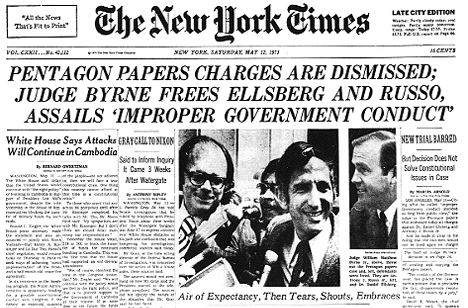
Se:
- Pentagon Papers (Wikipedia.org)
- The Pentagon Papers: Secrets, Lies and Audiotapes (The Nixon Tapes and the Supreme Court Tape). (National Security Archive Electronic Briefing Book, No.48, 5 June 2001). Also online at National Archives (June 2011)
- Pentagon Papers (Ellsberg.net)
50th anniversary of the Pentagon Papers release (Ellsberg.net, 13 June 2021). With Selected Media Coverage.
Death of a true believer (Weekly Worker, Issue 1448, 22 June 2023). “He exposed official lies, escaped the clutches of Richard Nixon’s goons and fought hard for pacifism for the rest of his life. Paul Demarty remembers Daniel Ellsberg.”
Daniel Ellsberg, American hero. By Chip Gibbons (Jacobin, June 16, 2023). “Few have contributed as much to resisting the horrors of war and the accompanying undemocratic regime of secrecy as Daniel Ellsberg, who died today at age 92.”
New York Times marks 50 years since Pentagon Papers, ignoring persecution of Julian Assange. By Bill Van Auken (World Socialist Web Site, 16 June 2021). “The New York Times marked the anniversary of its publication of documents exposing the government’s lies and criminality in the Vietnam War with a complicit silence on the imprisonment of Assange for doing the same in relation to Iraq and Afghanistan.”
50 years ago today, Daniel Ellsberg’s Pentagon Papers helped end the Vietnam War. By Chip Gibbons (Jacobin, June 13, 2021). “The first installment of reporting based on the Pentagon Papers was published half a century ago today in the New York Times. Pentagon whistleblower Daniel Ellsberg risked life imprisonment to expose the lies and brutality that the US war on Vietnam was based on.”
Washington releases Pentagon Papers 40 years after publication. By Bill Van Auken (World Socialist Web Site, 14 June 2011). “The documents served as an indictment not only of the Republican administration of Richard Nixon, but also of the Democratic administrations that had preceded it, particularly that of Lyndon B. Johnson.”
Daniel Ellsberg: WikiLeaks precursor and unsung foe of neoliberal economics. By Yanis Varoufakis (MR Online, December 16, 2010). “History will remember Ellsberg as an establishment figure, the Cold Warrior scientist and policy maker whose conscience rose up against his own endeavors and who performed a remarkable act of defiance: one that effectively undermined the moral and military case for continuing the Vietnam War.”
The most dangerous man in the world. By Saul Landau (CounterPunch, April 9, 2010). “The Papers showed the government had lied to Congress and the public about its reasons for invading Vietnam.”
My thoughts on ‘The Pentagon Papers’ movie. By Daniel Ellsberg (Antiwar.com, March 11, 2003). “Here are some of Dan’s thoughts on the film.”
Litteratur:
- Pentagon rapporten: som offentliggjort af The New York Times. Bind 1-3. Red. Neil Sheehan (Samlerens Piccolobøger, 1971, 592 sider). Omslagstitel: Uforkortet udgave af samtlige artikler i New York Timmes: Pentagon Rapporten – de hemmelige dokumenter om USAs krig i Vietnam.
Online på engelsk: The Pentagon Papers (National Archives).
Se også:
Fortidens synder V: Da Berlingske og Jyllands-Posten undlader at se i spejlet. Af Ulrik Dahlin (Information.dk, 1. september 2008).”Da New York Times offentliggør hemmelige dokumenter i den såkaldte Pentagon-rapport om amerikanske løgne i forbindelse med Vietnamkrigen, fører det ikke til journalistisk selvransagelse på Danmarks to store borgerlige aviser, selv om begge aviser tidligere i deres dækning af krigen har spist af amerikanernes hænder.”
Steven Spielberg fortæller vigtigt og underholdende om pressefrihed, whistleblowere og ligestilling i sin seneste film ’The Post’. Af Christian Monggaard (Information.dk, 5. april 2018). “Meryl Streep og Tom Hanks er fantastiske som to dedikerede avismennesker i Steven Spielbergs ’The Post’, der foregår i 1971 og handler om Pentagonpapirerne …”
Steven Spielberg’s The Post: To reveal government secrets and lies or not? By Joanne Laurier (World Socialist Web Site, 17 January 2018). “Steven Spielberg’s new film The Post recounts the internal struggle at the Washington Post over whether or not to publish the Pentagon Papers in June 1971.”
Daniel Ellsberg’s The Doomsday Machine: A prescient warning of the danger of nuclear war. By Kevin Martinez (World Socialist Web Site, 13 October 2018). Review of Daniel Ellsberg, The Doomsday Machine: Confessions of a Nuclear War Planner (Bloomsbury USA, 2017, 397 p.). “… a memoir of his days as a nuclear war strategist for the Pentagon and the RAND Corporation in the early 1960s.”
The Pentagon Papers and U.S. Imperialism in South East Asia. By Noam Chomsky (The Spokesman, Winter 1972/1973; online at Chomsky.info). “The motive force for the American war in Indochina lies, it seems to me, where it was located in the earliest internal documents of the state executive: in the perceived significance of Southeast Asia for the integrated global system that was to be organised by American power …”
Se også på Socialistisk Bibliotek:
- Tidslinjen 30. april 1975 om Saigons fald og USAs tilbagetrækning.
- Afsnittet Whistleblowers i VENSTREdot, nr. 15 (Tidsskriftcentret.dk, 19.4.2004; online at Internet Archive).
- Linksboksen Whisleblowers.
30. juni 1971
Modstandslederen Børge Thing, “Brandt” dør, (født 18. april 1917, se denne)
3. juli 1971
Første kvindelejr på Femø åbnes med deltagelse af 500 kvinder og 200 børn.
Se:
- Kvindelejren på Femø (Kvindelejr.dk). Se her om Lejrens historie.
- Femø Kvindelejr 1971- . Af Astrid Elkjær Sørensen (Danmarkshistorien.dk)
- Kvindelejren på Femø. Af Else Hansen (Historie-online.dk)
- Rødstrømpebevægelsen (Leksikon.org).
- Femø (Denstoredanske.dk)
- Kvindekamp og kønsroller, 1960-1985 (Danmarkshistorien.dk). Tema.
Kvindelejren i glimt gennem årene (Autonom Infoservice, 16. november 2020). Anmeldelse af Kvindelejren i glimt gennem årene: Jubilæumsskrift for Femølejren 1971-2020. Redigeret af Lisbeth Jørgensen (Kvindelejren, 2020, 140 s.). “Femølejren fylder 50 år. Det markeres med et jubilæumsskrift, der rummer såvel kærlighed som eftertanke og selvironisk satire.”
Femø 40 og 29 år efter. Af Gunna Starck (Modkraft.dk/blog, 24. juli 2012). “Jeg var på Femø nogle dage denne sommer. For første gang i 29 år og 40 år efter, at jeg var der første gang. Det var på alle måder en fin oplevelse, og skar ud i pap, hvor meget der er sket på godt og ondt siden.”
Femø kvindelejr 1971-2010 og femøisternes kollektive erindring om lejren (pdf). Af Anne Brædder (Arbejderhistorie, nr.3, 2010, s.70-86). “I artiklen belyses den kulturelle, sociale og politiske praksis på lejren fra 1971 til i dag og kvindernes erindringsfællesskab om kvindelejren.”
Politisk samvær i 1970’ernes ø-lejre (pdf). Af Laura Pérez Skardhamar (Arbejderhistorie, nr.3, 2010, s.51-69). “I tilgangen til ø-lejrfænomenet fokuseres på de intentioner og rationaler som ø-lejraktivister artikulerede og praktiserede i tilknytning til ø-lejrene. Karakteristisk for ø-lejrene var en stor mangfoldighed i emner og måder at gøre politik på.”
Femø – år 1 (Kvinfo, 19. september 2004). “Læs Bente Hansens historie om opholdet på verdens første kvindeølejr i dette uddrag af hendes nye bog En køn historie: erindringer fra kvindebevægelsen (Lindhardt & Ringhof, 2004).
Litteratur:
Femø. Af Anne Brædder (Århus Universitetsforlag, 2021, 100 sider (100 danmarkshistorier). Med indholdsfortegnelse, litteratur og noter online.
Se også på Socialistisk Bibliotek:
Tidslinjen: 8. april 1970, om rødstrømpebevægelsen
30. juli 1971
Arbejdernes “work-in” på det lukningstruede Upper Clyde skibsværft (USC) i Glasgow, Skotland. Ledende tillidsmand var Jimmy Reid (1932–2010), se nedenfor.
Se:
- Upper Clyde Shipbuilders (Wikipedia.org)
- Upper Clyde Shipbuilders (Working Class Movement Library)
Occupy! The Clyde work-in. By Sam Ord (Socialist Worker, Issue 2765, 27 July 2027). “Half a decade ago shipbuilders in Scotland led a battle to save their jobs. Sam Ord looks at how workers fought back against a brutal Tory government.”
The balance of class forces in recent years. By Tony Cliff (International Socialism, No.6, Autumn 1979). 2It was the struggle in Upper Clyde Shipbuilders that radically turned the tide of the Tory attack.”
Sit-ins: the experience. By Roger Rosewell (International Socialism, No.53, October-December 1972). “Sit-ins in Britain have been primarily used as a defensive method of fighting unemployment, the major exception being the engineers’ wages struggle.”
Se også:
- Obituary: Jimmy Reid. By John Foster and David Torrance (Morning Star, 12 August 2010)
- Jimmy Reid 1932-2010. By Dave Sherry (Socialist Worker, Issue 2215, 21 August 2010)
- Jimmy Reid, Stalinist union leader who betrayed Scottish shipyard struggle, dies at 78. By Steve James (World Socialist Web Site, 25 August 2010)
- Editorial board statement on the death of Jimmy Reid (Scottish Left Review, August 2010)
22. august 1971
Den sorte panter George Jackson myrdes i amerikansk fængsel.
Se:
- George Jackson (Black Panther) (Wikipedia.org)
- George Jackson (1942–1971) (World History Arhives)
Video:
-
Conrad George Jackson Documentary (YouTube.com; 1:32:31 hours) “Day of the Gun”.
Litteratur:
- Soledad brødrene : George Jacksons fængselsbreve (Schønbergske Forlag, 1971).
28. august 1971
Den første musikfestival i Roskilde over to dage, Sound Festival, 28.-29.8.
I 1972 overtager Roskilde Fonden ansvaret for at arrangere Roskilde Festival, og i 1978 tages Orange Scene i brug.
Se på Socialistisk Bibliotek:
- Linkboxen: Roskilde Festival: Roskilde Festival gennem årene på Modkraft.dk/Socialistisk Bibliotek
Leksikalt:
- Roskilde Festival (Denstoredanske.dk)
- Roskilde Festival (Wikipedia.dk)
- Roskilde Festival (eget site)
11. september 1971
Opstand i det amerikanske fængsel Attica i New York.
Se:
- Attica Prison riot (Wikipedia.org)
The “Long Attica Revolt”. By Robert J. Boyle (Against the Current, Issue 321, July-August 2024). Review of Orisanmi Burton, Tip of the Spear: Black Radicalism, Prison Repression and the Long Attica Revolt (University of California Press, 2023, 328 p.). “In his meticulously researched and fascinating Tip of the Spear, Dr. Burton sets himself apart from the great majority of books and films on U.S. prisons that primarily focus on prison conditions, guard brutality and efforts at reform.”
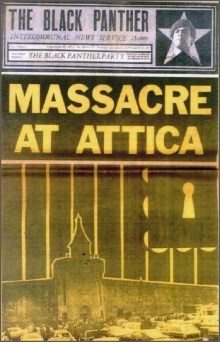
Attica puts audiences in the middle of America’s bloodiest prison riot. By Ed Rampell (Jacobin, November 6, 2021). “The new Showtime documentary Attica covers the 1971 riot at the Attica Correctional Facility. Award-winning filmmaker Stanley Nelson talks to Jacobin about the revolt and the state massacre that slaughtered prisoners and ended a movement for human dignity.”
The fury of the oppressed at Attica. By Luke Pickrell (SocialistWorker.org, September 8, 2017). “The Attica prison uprising of 1971 took place against the backdrop of atrocious conditions and the impact of the Black Power movement.”
Attica: The revolt and afterward. By Jack M. Bloom (Against the Current, Issue 187, March-April 2017). Review of Heather Ann Thompson, Blood in the Water: The Attica Prison Uprising of 1971 and Its Legacy (Pantheon Books, 2016, 724 p.) + review by Elizabeth Rapaport: A complete story of Attica (New Politics: A Journal of Socialist Thought, Issue 63, Summer 2017). See also interview with Heather Ann Thompson: Attica from 1971 to today (Against the Current, Issue 190, September-October 2017)
A prison uprising and its brutal suppression. By Lee Wengraf (International Socialist Review, Issue 81, January-February 2012). Review of Tom Wicker, A Time to Die: The Attica Prison Revolt (Haymarket Books, 2011)
Forty years since the Attica uprising: Nixon-Rockefeller tapes praise bloodbath – ‘A beautiful operation’. By Nancy Hanover (World Socialist Web Site, 26 September 2011)
Rebellion at Attica. By Lee Wengraf (SocialistWorker.org, September 9, 2011)
Legacy of the Attica rebellion (SocialistWorker.org, March 17, 2011). Joseph ‘Jazz’ Hayden, a former Attica prisoner and activist for prisoner civil rights, spoke to Lee Wengraf.
New York state makes settlement offer to Attica inmates. By Fred Mazelis (World Socialist Web Site, 18 January 2000)
Video:
- Video: Attica is all of us: Cornel West on 40th anniversary of Attica Prison rebellion (Democracy Now! September 12, 2011)
- RBG- 1971 Attica Rebellion And Massacre 1 of 3
- 1971 Attica Rebellion And Massacre 2 of 3
- 1971 Attica Rebellion And Massacre 3 of 3
12. september 1971
Lokale beboere på Nørrebro besætter tom fabriksbygning
i Stengade og etablerer Folkets Hus.
Se:
- Folkets Hus. Site for Folkets Hus, Stengade 50, 2200 N.
13. september 1971
Kinas forsvarsminister og næstformand i Kinas Kommunistiske Parti (Mao Zedongs “nære kampfælle” og kongresvalgte efterfølger), Lin Biao, omkommer i et nedskudt fly på vej til Sovjetunionen efter et mislykket militærkup.

Se:
- Lin Piao (Leksikon.org)
- Lin Biao (Lin Piao) Reference Archive (Marxists Internet Archive)
- The Lin Piao affair. – i: Nigel Harris: The Mandate of Heaven (1978), Part II: The People’s Republic; After the Cultural Revolution. Scroll down.
15. september 1971
Det første kvindehus tages i besiddelse i København, Åbenrå 26-30.
Se:
- Danske kvinder fortæller: Kvindehuse (Statsbiblioteket; Dansk Lydhistorie)
Litteratur:
- Rødstrømperne: den danske Rødstrømpebevægelses udvikling, nytænkning og gennemslag 1970-1985. Bind 1. Af Drude Dahlerup (Gyldendal, 1998, side 203)
26. september 1971
Om natten befries Bådsmandsstrædes Kaserne og bliver til Fristaden Christiania. Teksten “Christiania – en fristat 26.9.71 kl. 12.08 blev malet på en port til området (Kilde: Politiken, 18.9.2016, PS side 4)

Se:
- Christiania (Leksikon.org)
- Fristaden Christiania (Christiania.org). Eget site.
- Christiania 40 år. Af Sune Hundebøll (Rådhusbiblioteket, 5 september 2011). Linksamling i anledning af Rådhusbibliotekets udstilling om Christiania.
- Emnelisten Forsvar Fristaden Christiania (Tidsskriftcentret.dk, 2003; online på Internet Archive WayBackMachine)
8. oktober 1971
Politiet rydder 28 besætterne fra Boligfronten, der havde besat Nationalbankens bygning i Havnegade 111-19 og Niels Juelsgade 2-14 (med over 100 flotte lejligheder) i protest mod nedrivningen til fordel for Arne Jacobsens nuværende skrummel af en nationalbank.
31. oktober 1971
Politiets Efterretningstjenestes forsøg på at hverve medlem af Socialistisk Ungdoms Forum (SUF, senere SAP) til bl.a. tyveri af dokumenter afsløres.
Se:
- Kasper Neergaard sagen (Leksikon.org)
- Efterretningstjenesten: PETs blodige informationsudveksling. Af Svend Vestergaard Jensen (Socialistisk Information, 22.10.09)
Litteratur:
- PET’s overvågning af den antiimperialistiske venstrefløj 1945-1989 (pdf) (PET-kommissionens beretning, bind 9). Kap. 6: Kilder og de overvågede miljøer i 1969’erne … [afsnit 3]: Kasper Neergaard-sagen.
- Efterretningstjeneste på udflugt: Kasper Neergaard-sagen. Af Mads Nissen Styrk mfl. (Demos, 1972) (Demos dokument, nr. 5).
















